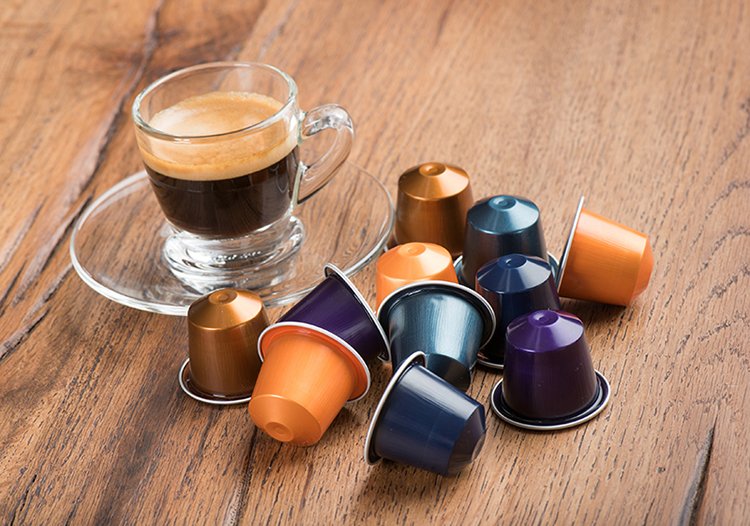Major talking points at the European Congress on Coffee Capsules
Trends
August 3, 2018Reading time: 3 minutes
Giorgio Dini, Amcor’s Marketing Manager for coffee, shares his reflections on the second European Congress on Coffee Capsules packaging, where sustainability and functionality were key talking points.
Giorgio Dini, Amcor’s Marketing Manager for coffee, shares his reflections on the second European Congress on Coffee Capsules packaging, where sustainability and functionality were key talking points.

Sustainability: Consumer concerns
Capsules are a significant segment of the coffee market. According to a 2017 report, fresh ground coffee pods are the fastest growing category across all hot drinks and increased at an average annual rate of 18% between 2011 and 2016.
However, there are barriers to further growth. Another study found that environmental concerns stop some consumers from using capsules.
Giorgio Dini, Amcor’s Marketing Manager for coffee, believes that sustainability is central to the capsules market at the moment. Reporting back from this year’s European Congress on Coffee Capsules, he observed that “the two big trends in capsules are sustainability and differentiation. One is supporting the other. In some cases, sustainability is a vehicle for differentiation.”
Sustainability: The industry responds with new compostable materials
Manufacturers are responding to consumers’ concerns about sustainability by developing pods in new materials. As Giorgio observes, “increasingly the direction of the market is moving away from the plastic capsules into high barrier compostable and aluminium.”
Part of the problem with plastic capsules is that although many are theoretically recyclable, often this doesn’t happen as it may require the consumer to remove the residual coffee from the packaging and then separate the lid.
In contrast, compostable capsules seem to offer an ideal solution (assuming the composting stream of the country accepts them in their cycle). An additional challenge is that coffee requires high barrier protection and at the moment, high barrier compostable capsules are not widely used.
For example, a paper capsule suitable for home composting was shown at the Congress. But Giorgio points out that “the downside of these is that there is no barrier, so you will need secondary packaging anyway” – making them a less sustainable solution than they initially appear.
Another example showcased at the Congress was a prototype high barrier paper solution for lidding on capsules. This is still in initial stages of development, meaning that “the strength of barrier achievable is still to be proven. It’s too early to say whether it will be successful, and it’s still not the best option technically – not yet at least.”
Despite these limitations, new technical innovations are important in helping to develop more sustainable solutions for the future. Amcor, for instance, has formed industry partnerships to develop high barrier compostable lidding with the required shelf life, which could be ground-breaking further down the line.
Until the barrier issues with compostable materials have been resolved, aluminium is potentially providing a circular life cycle. Several European countries have nationwide initiatives to improve the recycling of aluminium, including coffee capsules, and it is possible to recycle back the coffee capsules into aluminium through processes like pyrolysis.
Functionality: An issue for consumers
Alongside concerns about sustainability, difficulties with functionality are a pressing issue.
Giorgio identifies this as a big pain point as many compatible capsules do not work well, and this impaired functionality directly affects the end drink: “Some of the water is going through the capsule and not reaching the cup, but going out into the machine tray. That means that the balance of temperature and pressure of the water going through is not optimised, so the structure of the coffee is not perfect.”
As a result, “maybe the coffee quality is good, but if the functionality in the machine is poor, then that is the outcome: the cup of coffee is also poor.”
Functionality: Intellectual Property rights restrict the industry’s response
Awareness of this problem was apparent at the Congress.
One of the most well attended and engaged presentations focused on patents, reflecting the importance of Intellectual Property (IP) rights in this industry (there are hundreds of IP restrictions related to capsules). As a European capsule manufacturer observed, these tight restrictions leave the whole industry with the question, how much is a brand going to risk in terms of IP infringement?
Also, IP directly affects functionality; in some cases, a solution chosen to modify existing IPs isn’t in the best interests of good quality coffee.
It is typical for leading coffee packaging solutions firms to make changes to the brewing machines, which often impacts the way compatible capsules work. In those cases, “it may become really hard to replicate the same functionality of the original capsules,” remarks Giorgio.
And so with demand for capsules only rising, companies big and small, new and well-established, face a real test of innovation. High quality, sustainable and compliant with patent law – it is no small feat to succeed in today’s coffee capsule market. Let’s see how far we’ve come by Congress 2019.
If you want to learn about our approach and coffee products, visit our Coffee page.
Related Insights
Cafés Folliet | Premiumising its coffee offering with Amcor’s Vento
May 28, 2018
Imagine a technology that allows a coffee brand to easily premiumise its product. We speak to Cafés Folliet’s purchasing manager Raphael Tollot about how an Amcor product did exactly that.
Imagine a technology that allows a coffee brand to easily premiumise its product. We speak to Cafés Folliet’s purchasing manager Raphael Tollot about how an Amcor product did exactly that.
6 ways coffee brands can differentiate with packaging design
February 14, 2018
With coffee’s global appeal making the market highly competitive, we explore the different design tactics used to help products stand out from the crowd and catch consumers’ attention on the supermarket shelf.
With coffee’s global appeal making the market highly competitive, we explore the different design tactics used to help products stand out from the crowd and catch consumers’ attention on the supermarket shelf.
